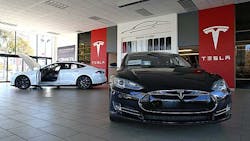Tesla Sales Falling Flat Clouds Outlook for Musk's Bold Targets
Tesla Inc. deliveries are flatlining amid persistent production snafus, reinforcing concern that Elon Musk may again be setting targets that his electric-car company won’t hit on time.
The maker of Model S sedans and Model X sport utility vehicles has reported quarter-by-quarter shipment declines for the second time in the past year. In addition to stoking fear about whether demand has peaked, these figures cast doubt on whether Musk can pull off a steep production ramp for his most ambitious offering yet, the cheaper Model 3 sedan.
“Tesla’s Q2 production and deliveries report raised more questions than answers, particularly about Model S and X demand,” Toni Sacconaghi, a Sanford C. Bernstein analyst, wrote in a report Wednesday. “The Tesla investment thesis hinges on the success of Model 3, and the ability for the company to ramp production, make the car profitably and deliver good initial build quality.”
Musk has a history of setting aggressive goals and timelines for Tesla and coming up short, including his calls for how soon the Model X SUV and less-expensive Model 3 sedan would follow the company’s top-selling Model S. His latest target -- producing the Model 3 at a rate of 20,000 cars per month in December -- reinforces the challenge ahead. That’s nearly as many vehicles as the company has delivered quarterly over the last year.
Tesla plunged as much as 6.1% on July 5 to $331, the steepest intraday decline since May 4. After the market closed on July 3, the company reported more than 22,000 vehicle deliveries in the second quarter, down from 25,051 in the first three months of the year.
Demand for Tesla’s higher-priced Model S sedans and Model X sport utility vehicles appears to be plateauing, analysts at Goldman Sachs Group Inc. and KeyBanc Capital Markets said in reports on July 5.
“While it is nice to see Tesla finally hit a stated target on time, we question whether 30 vehicle deliveries essentially built by hand count as ‘mass production’ and we also are surprised that this ‘mass market’ vehicle does not have official photos, options, pricing or really any details available,” Jeff Osborne of Cowen and Co. wrote in note to clients on July 5.
Goldman Sachs cut its six-month price target for Tesla stock by $10, to $180. Eight analysts rate the shares a buy, 10 recommend holding and six suggest selling.
In the statement released after the close of trading on July 3, Tesla didn’t disclose the number of cars in transit, a departure from previous reports. Deliveries were impacted by production issues with 100 kWh batteries, according to the company.
Second-half Model S and Model X deliveries are expected to exceed first-half sales “provided global economic conditions do not worsen considerably,” Tesla said.
By Dana Hull
About the Author
Bloomberg
Licensed content from Bloomberg, copyright 2016.
